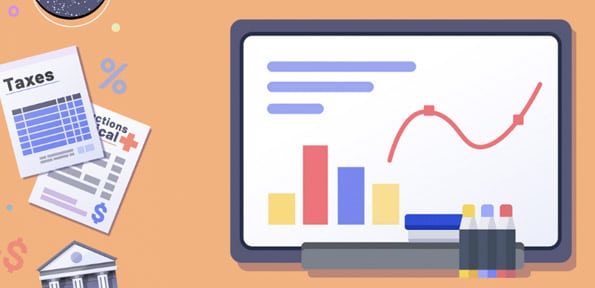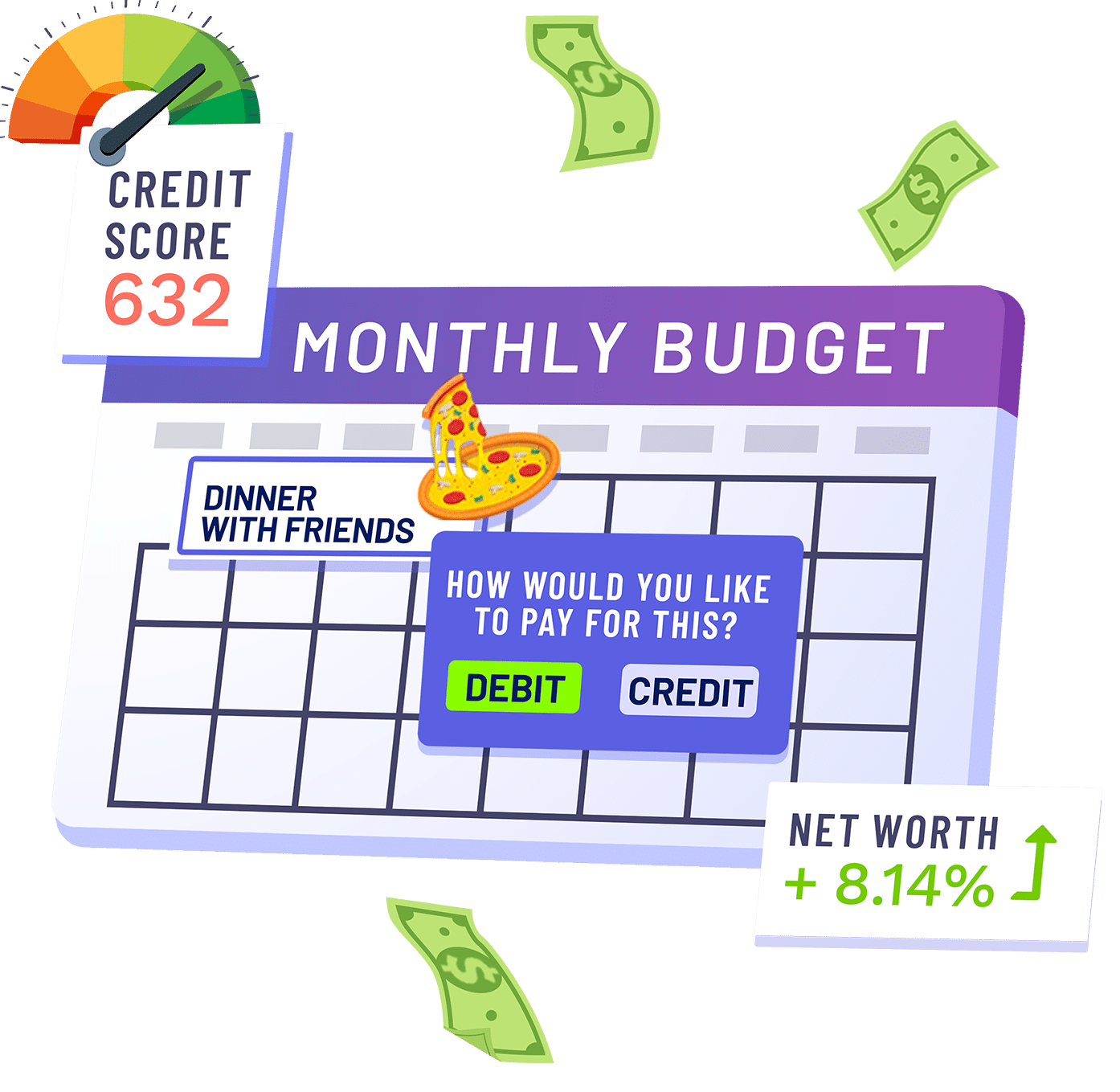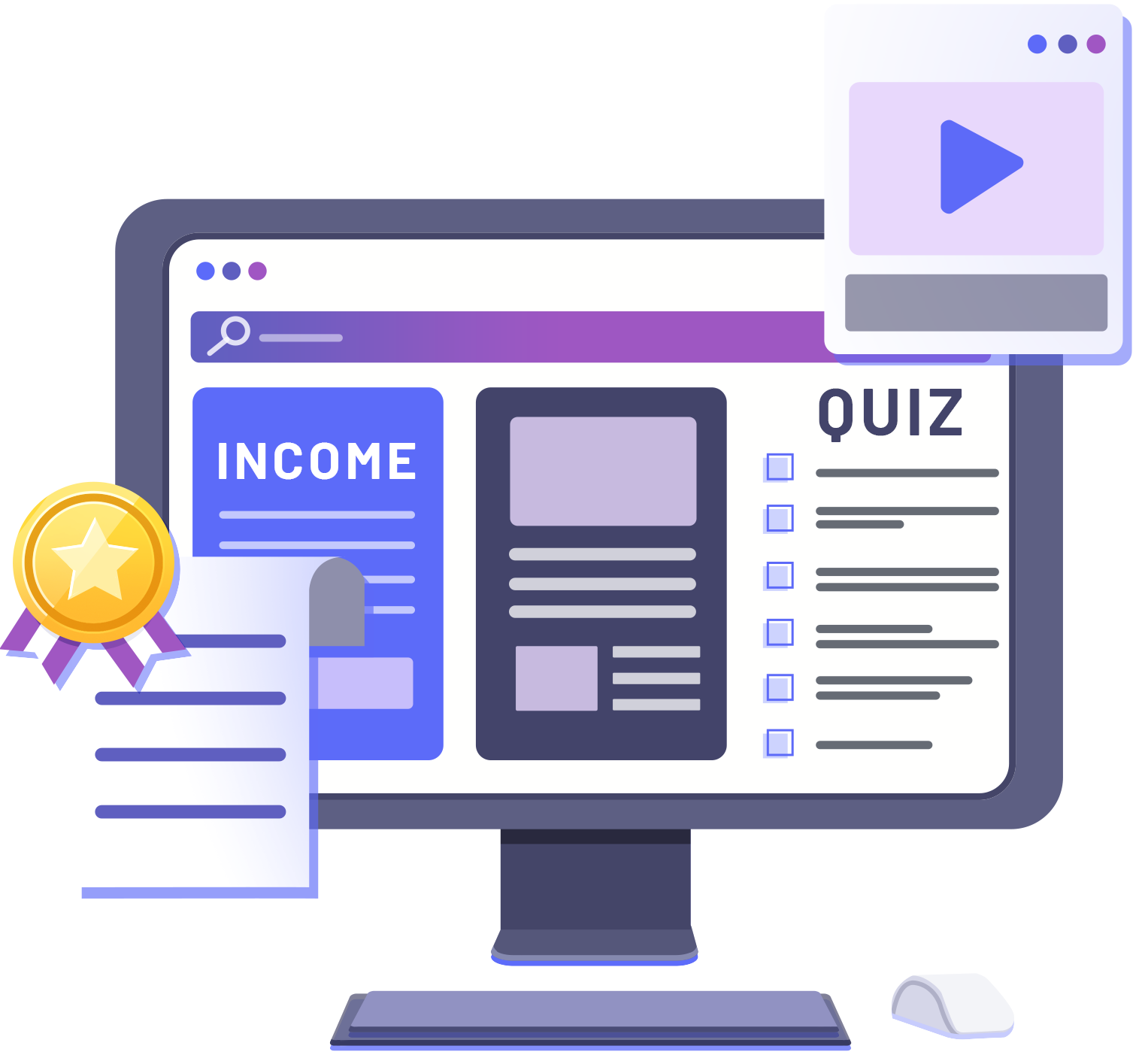| Design, analyze, and apply a financial plan based on short- and long-term financial
goals | | | | | | |
| Develop a financial plan including a budget based on short- and long- term goals. | Budget Game – Core Component
Lesson – Budgeting
Lesson – Budgeting and Spending Strategies
Lesson – Spending and Savings Plans
Lesson – Pay Yourself First
Lesson – Preparing For Retirement | | | | | |
| Analyze financial information for accuracy, relevance, and steps for identity protection. | Lesson – What is an Income Statement?
Lesson – What is a Balance Sheet?
Lesson – What Is A Cash Flow Statement
Lesson – Financial Records and Receipts | | | | | |
| Describe factors affecting take�home pay. | Budget Game – Core Component
Lesson – Income and Compensation
Lesson – Tax Filing and the Form 1040 | | | | | |
| Identify sources of personal income and likely deductions and expenditures as a basis for a financial plan. | Lesson – Income and Compensation
Lesson – Tax Filing and the Form 1040
Lesson – Taxation Overview
Lesson – Common Tax Deductions
Lesson – Common Tax Additions | | | | | |
| Describe legal and ethical responsibilities regarding tax liabilities. | Lesson – Tax Filing and the Form 1040
Lesson – Taxation Overview
Lesson – Sales Tax |
| | | | |
| Analyze strategic spending, saving, and investment options to achieve the objectives of diversification, liquidity, income, and growth. |
Activity |
Long-Term Game |
Comprehensive Chapter |
Short Lesson |
Interactive Calculator |
Graded Assessment |
| Compare and contrast the variety of investments available for a diversified portfolio. | Stock Game – Core Component
Lesson – Building a diversified portfolio
Lesson – Investing Strategies | | | | | |
| Evaluate factors to consider when
managing savings and investment accounts. | Investing101 – Chapter 1: Introduction to Investing
Investing101 – Chapter 5: Now That I Own It, What Should I Do?
Lesson – Preparing For Retirement
Lesson – What is Wealth? | | | | | |
| Explain how economic cycles affect personal financial decisions. | Lesson – The Business Cycle
Lesson – Risk
Lesson – Importance of Interest Rates | | | | | |
| Describe the appropriate types of
investments to achieve the objectives of liquidity, income and growth. | Investing101 – Chapter 1: Introduction to Investing
Lesson – Building a diversified portfolio
Lesson – Investing Strategies | | | | | |
| The components of personal credit to manage credit and debt |
Activity |
Long-Term Game |
Comprehensive Chapter |
Short Lesson |
Interactive Calculator |
Graded Assessment |
| Analyze various lending sources, services, and financial institutions. | Lesson – Short-Term Financing
Lesson – Using Credit
Lesson – Good Debt, Bad Debt | | | | | |
| Investigate legal and personal responsibilities affecting lenders and borrowers. | Lesson – Managing Debt | | | | | |
| Make connections between building and maintaining a credit history and its impact on lifestyle. | Lesson – Credit Reports | | | | | |
| Identify, develop, and evaluate risk-management strategies |
Activity |
Long-Term Game |
Comprehensive Chapter |
Short Lesson |
Interactive Calculator |
Graded Assessment |
| Differentiate between types of insurance. | Lesson – Renter’s Insurance
Lesson – Home Owner’s Insurance
Lesson – Rental Agreements and Homeowner’s Associations
Lesson – Car Insurance
Lesson – Life Insurance
Lesson – Health Insurance | | | | | |
| Explain the function and purpose of insurance. | Lesson – Renter’s Insurance
Lesson – Home Owner’s Insurance
Lesson – Rental Agreements and Homeowner’s Associations
Lesson – Car Insurance
Lesson – Life Insurance
Lesson – Health Insurance | | | | | |
| Select and evaluate strategies to
mitigate risk. | Lesson – Risk
Lesson – Protecting Against Fraud | | | | | |
| Manage personal credit and debt |
Activity |
Long-Term Game |
Comprehensive Chapter |
Short Lesson |
Interactive Calculator |
Graded Assessment |
| Identify and differentiate between purposes and reasons for debt | Lesson – Short-Term Financing
Lesson – Using Credit
Lesson – Good Debt, Bad Debt
Lesson – Mortgages | | | | | |
| Analyze benefits and costs of credit and debt | Lesson – Short-Term Financing
Lesson – Using Credit
Lesson – Good Debt, Bad Debt
Lesson – Mortgages | | | | | |
| Compare sources of credit | Lesson – Short-Term Financing | | | | | |
| Describe the components of a credit history | Lesson – Credit Reports
Lesson – Using Credit | | | | | |
| Graphs, tables and equations can be used to distinguish between linear and nonlinear
functions |
Activity |
Long-Term Game |
Comprehensive Chapter |
Short Lesson |
Interactive Calculator |
Graded Assessment |
| Analyze how credit and debt impact personal financial goals | Budget Game – Core Component
Lesson – Using Spreadsheets – Graphing
Lesson – Pay Yourself First
Lesson – Managing Debt
Lesson – Good Debt, Bad Debt
Lesson – Managing Bills | | | | | |
| The distribution of resources influences economic production and individual
choices |
Activity |
Long-Term Game |
Comprehensive Chapter |
Short Lesson |
Interactive Calculator |
Graded Assessment |
| Explain the role of taxes in economic production and distribution of resources | Lesson – Labor and Productivity
Lesson – What are Price Controls?
Lesson – Fiscal Policy Explained
Lesson – Government Impact on the Economy | | | | | |
| Define the various types of taxes students will pay as adults | Lesson – Taxation Overview
Lesson – Sales Tax
Lesson – Tax Filing and the Form 1040
Lesson – Income and Compensation | | | | | |
| Demonstrate the impact of taxes on individual income and spending | Lesson – Fiscal Policy Explained
Lesson – Time Value of Money
Lesson – Taxation Overview | | | | | |
| Various factors that influence production, including resources, supply and demand, and price, affect individual consumer choices over time | Lesson – Family Planning
Lesson – Externalities
Lesson – The Importance of Interest Rates
Lesson – Supply and Demand Examples in the Stock Market | | | | | |
| Saving and investing are key contributors to financial well-being |
Activity |
Long-Term Game |
Comprehensive Chapter |
Short Lesson |
Interactive Calculator |
Graded Assessment |
| Differentiate between saving and investing | Budget Game – Core Component
Stock Game – Core Component
Lesson – Why invest in Stocks?
Lesson – How to Choose and Compare Stocks
Lesson – Preparing for Retirement
Lesson – Building Wealth | | | | | |
| Give examples of how saving and investing can improve financial well-being | Budget Game – Core Component
Lesson – Pay Yourself First
Lesson – Preparing for Retirement
Lesson – Preparing for Long-term Purchases
Lesson – Family Planning
Lesson – Building Wealth | | | | | |
| Describe the advantages and disadvantages of saving for short and medium-term goals | Budget Game – Core Component
Lesson – Pay Yourself First | | | | | |
| Explain the importance of an emergency fund | Budget Game – Core Component
Lesson – Pay Yourself First
Lesson – Preparing for Retirement
Lesson – Preparing for Long-term Purchases | | | | | |
| Explain why saving is a prerequisite to investing | Budget Game – Core Component
Lesson – Pay Yourself First
Lesson – Preparing for Retirement
Lesson – Preparing for Long-term Purchases | | | | | |
| Explain how saving and investing income can improve financial well-being | Budget Game – Core Component
Lesson – Pay Yourself First
Lesson – Preparing for Retirement
Lesson – Preparing for Long-term Purchases | | | | | |
| Use of financial institutions to manage personal finances |
Activity |
Long-Term Game |
Comprehensive Chapter |
Short Lesson |
Interactive Calculator |
Graded Assessment |
| Identify different financial institutions | Lesson – Banks, Credit Unions, and Savings and Loans | | | | | |
| Identify the products and services of financial institutions to include
but not limited to: checking accounts, savings accounts, investments, and loans “ | Lesson – Banks, Credit Unions, and Savings and Loans | | | | | |
| Compare and contrast financial institutions, their products, and services | Lesson – Banks, Credit Unions, and Savings and Loans | | | | | |
| The relationship between choice and opportunity cost |
Activity |
Long-Term Game |
Comprehensive Chapter |
Short Lesson |
Interactive Calculator |
Graded Assessment |
| The relationship between choice and opportunity cost | Budget Game – Core Component
Lesson – Opportunity Cost
Lesson – Pay Yourself First | | | | | |
| Analyze different choices and their opportunity costs | Budget Game – Core Component
Lesson – Opportunity Cost
Lesson – Pay Yourself First | | | | | |
| Give examples of the opportunity costs for individual decisions | Budget Game – Core Component
Lesson – Opportunity Cost
Lesson – Pay Yourself First | | | | | |
| Identify risks that individuals face | Lesson – Risk
Lesson – Importance of Interest Rates
Lesson – The Business Cycle
Lesson – Preparing for Spending Shocks | | | | | |
| Analyze methods of limiting financial risk | Budget Game – Core Component
Lesson – Risk
Lesson – Protecting Against Fraud
Lesson – Life Insurance | | | | | |
| Describe how to meet short term financial goals |
Activity |
Long-Term Game |
Comprehensive Chapter |
Short Lesson |
Interactive Calculator |
Graded Assessment |
| Identify sources of income including gifts, allowances, and earnings | Lesson – Income and Compensation | | | | | |
| Recognize that there are costs and benefits associated with borrowing to meet a short-term financial goal | Lesson – Short-Term Financing | | | | | |
| Identify jobs children can do to earn money for personal, philanthropic, or entrepreneurial goals | Lesson – Income and Compensation
Lesson – Career Development
Lesson – Charitable Giving | | | | | |
| Create a plan for a short-term financial goal | Lesson – Budgeting
Lesson – Spending and Saving Plans | | | | | |
| Describe the steps necessary to reach short-term financial goals | Lesson – Budgeting
Lesson – Spending and Saving Plans | | | | | |
| Identify short-term financial goals |
Activity |
Long-Term Game |
Comprehensive Chapter |
Short Lesson |
Interactive Calculator |
Graded Assessment |
| Define a short-term financial goal | Lesson – Budgeting
Lesson – Spending and Saving Plans | | | | | |
| Identify examples of short-term financial goals | Lesson – Budgeting and Spending Strategies
Lesson – Managing Bills
Lesson – Building Wealth | | | | | |
| Discuss sources of income needed to meet short-term goals such as but not limited to gifts, borrowing, allowances, and income | Budget Game – Core Component
Lesson – Income and Compensation | | | | | |
| Quantitative reasoning is used to make sense of quantities and their relationships in problem situations |
Activity |
Long-Term Game |
Comprehensive Chapter |
Short Lesson |
Interactive Calculator |
Graded Assessment |
| Describe factors affecting take-home pay and calculate the impact. | Budget Game – Core Component
Lesson – Income and Compensation
Lesson – Tax Filing and the Form 1040 | | | | | |
| Design and use a budget, including income (net take-home pay) and expenses (mortgage, car loans, and living expenses) to demonstrate how living within your means is essential for a secure financial future. | Budget Game – Core Component
Lesson – Income and Compensation
Lesson – Budgeting and Spending Strategies
Lesson – Pay Yourself First
Activity – Use the Car Loans Calculator | | | | | |
| How much money is enough for retirement? | Activity – Use the Saving to be a Millionaire Calculator
Lesson – Preparing for Retirement | | | | | |
| What is the return on investment of post-secondary educational opportunities? | Lesson – Student Loans
Lesson – Career Development
Lesson – How To Choose an Internship | | | | | |
| Formulate, represent, and use algorithms to compute with flexibility, accuracy, and efficiency |
Activity |
Long-Term Game |
Comprehensive Chapter |
Short Lesson |
Interactive Calculator |
Graded Assessment |
| Using the four operations analyze the relationship between choice and opportunity cost | Lesson – What is Opportunity Cost? | | | | | |
| The scarcity of resources affects the choices of individuals and communities |
Activity |
Long-Term Game |
Comprehensive Chapter |
Short Lesson |
Interactive Calculator |
Graded Assessment |
| Decisions must be made if there is a limited amount of income and the need for a costly good or service. For example, you may borrow, save, or get a new job to make the purchase. | Lesson – Career Development
Lesson – Managing Bills
Lesson – Pay Yourself First
Lesson – Spending and Savings Plans | | | | | |
| Apply decision-making processes to financial decisions |
Activity |
Long-Term Game |
Comprehensive Chapter |
Short Lesson |
Interactive Calculator |
Graded Assessment |
| Identify components of financial decision-making including gathering, evaluating, and prioritizing information based on a financial goal, and predicting the possible outcome of a decision | Lesson – Preparing for spending shocks
Lesson – Planning Long Term Purchases
Lesson – Researching Spending | | | | | |
| Differentiate between a long-term and a short-term goal | Activity – Use the Investment Return Calculator
Lesson – Investing Strategies
Lesson – Preparing for spending shocks
Lesson – Pay Yourself First
Lesson – Planning Long Term Purchases | | | | | |
| Functions model situations where one quantity determines another and can be represented algebraically, graphically, and using tables. |
Activity |
Long-Term Game |
Comprehensive Chapter |
Short Lesson |
Interactive Calculator |
Graded Assessment |
| Knowledge of how to interpret rate of change of a function allows investigation of rate of return and time on the value of investments. | Stock Game – Core Component
Activity – Use the Investment Return Calculator
Lesson – Time Value of Money
Investing101 Certification | | | | | |
| Quantitative relationships in the real world can be modeled and solved using functions |
Activity |
Long-Term Game |
Comprehensive Chapter |
Short Lesson |
Interactive Calculator |
Graded Assessment |
| Analyze the impact of interest rates on a personal financial plan. | Lesson – The Importance of Interest Rates | | | | | |
| Evaluate the costs and benefits of credit. | Lesson – Good Debt, Bad Debt | | | | | |
| Analyze various lending sources, services, and financial institutions. | Lesson – Banks, Credit Unions, and Savings and Loans
Lesson – Short-Term Financing | | | | | |
| How much would today’s purchase cost tomorrow? | Activity – Use the Net Present Value Calculator | | | | | |
| Number patterns are based on operations and relationships |
Activity |
Long-Term Game |
Comprehensive Chapter |
Short Lesson |
Interactive Calculator |
Graded Assessment |
| Use patterns to solve problems including those involving saving and checking accounts | Lesson – Debit Cards
Activity – Use the Compound Interest Calculator | | | | | |
| Explain, extend, and use patterns and relationships in solving problems, including those involving saving and
checking accounts such as understanding that spending more means saving less | Budget Game – Core Component
Lesson – Budgeting and Spending Strategies
Lesson – Spending and Savings Plans
Lesson – Pay Yourself First | | | | | |
| Probability models outcomes for situations in which there is inherent randomness |
Activity |
Long-Term Game |
Comprehensive Chapter |
Short Lesson |
Interactive Calculator |
Graded Assessment |
| Analyze the cost of insurance as a method to offset the risk of a situation. | Lesson – Car Insurance
Lesson – Life Insurance
Lesson – Health Insurance | | | | | |
| How does probability relate to obtaining insurance? | Lesson – Car Insurance
Lesson – Life Insurance
Lesson – Health Insurance | | | | | |
| Comprehension of probability allows informed decision making, such as whether the cost of insurance is less than the expected cost of illness, when the deductible on car insurance is optimal, whether gambling pays in the long run, or whether an extended warranty justifies the cost. | Lesson – Renter’s Insurance
Lesson – Home Owner’s Insurance
Lesson – Car Insurance
Lesson – Life Insurance
Lesson – Health Insurance | | | | | |












